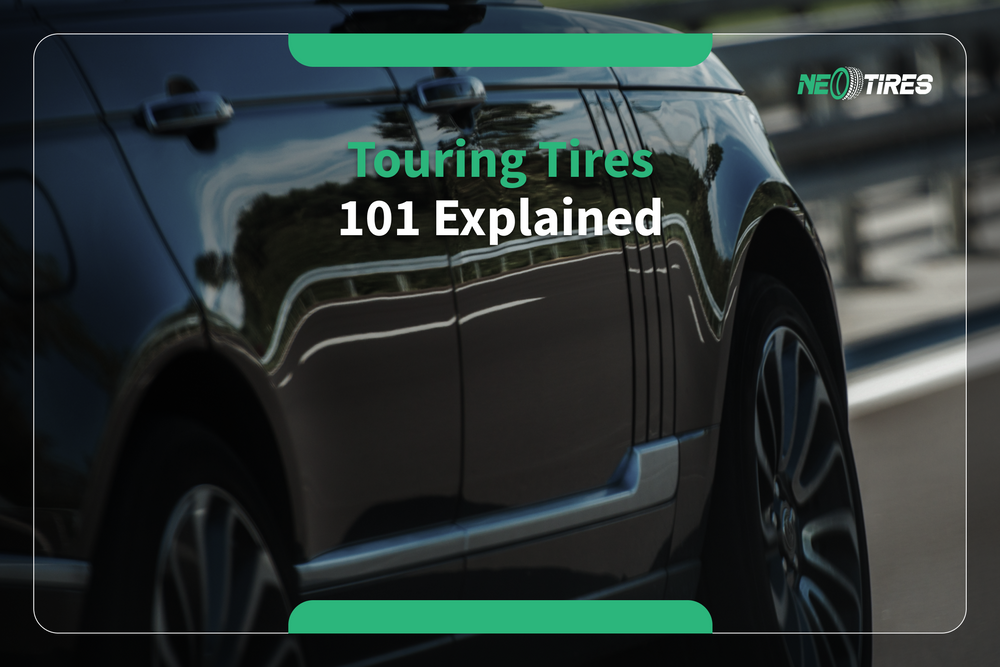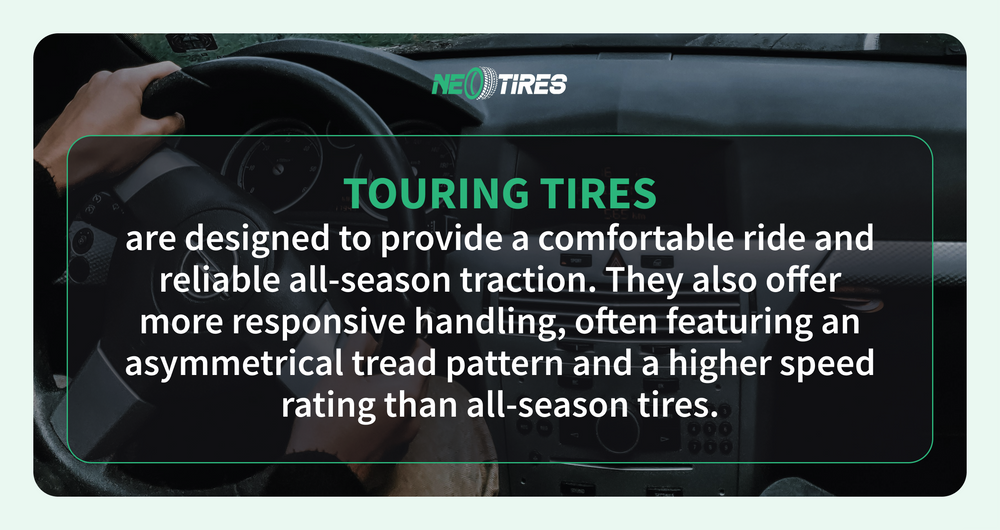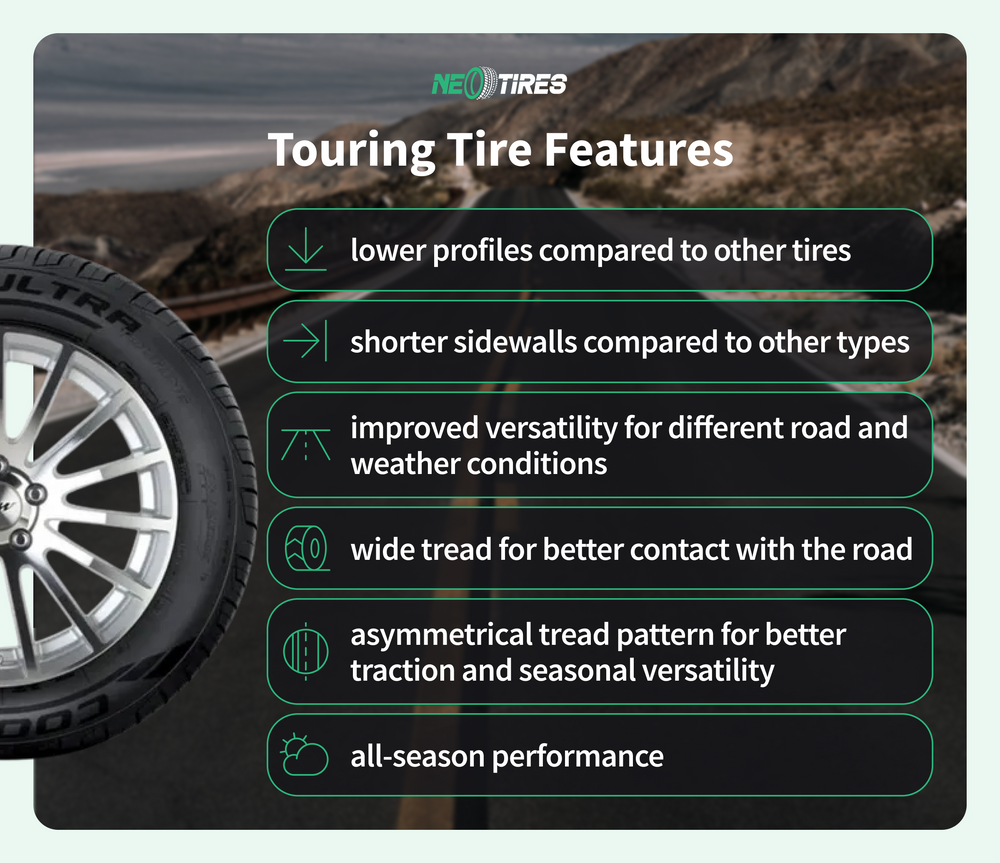Touring tires are popular among everyday drivers who want comfort, durability, and reliable all-season performance. But are they the right choice for your vehicle? This guide explains what touring tires are, their pros and cons, the different types, and tips for choosing the proper set.
What Are Touring Tires?
Touring tires are a tire category designed to prioritize quietness, comfort, and long tread life during driving. Touring tires generally provide dependable handling, balance, and fuel economy, often being the option of choice for daily commuters and long-distance drivers.
Key characteristics of touring tires:
* Rubber compounds and tread patterns optimized for smooth, quiet driving
* Balanced handling on dry and wet surfaces
* Tread life serving longer compared to standard tires
Touring tires are a subcategory of all-season tires that prioritize comfort, durability, and stable handling. Their tread life is typically longer compared to regular passenger tires.
Main Features of Touring Tires
Touring tires blend the versatility of all-season tires with the stability of performance tires. Touring tires typically feature a wide contact patch to ensure stability and grip, noise-suppressing tread patterns for quiet driving, durable compounds that provide long mileage of up to 80,000 miles, and an asymmetrical or symmetrical design to ensure all-season traction.
5 Advantages of Touring Tires
There are five main advantages of touring tires: long tread life up to 80,000 miles, high comfort levels, predictable and responsive handling, fuel economy, and year-round traction.
Long Tread Life
Touring tires are among the longest-lasting tires on the market, with a tread life ranging between 40,000-80,000 miles, compared to 20,000-40,000 miles of summer tires or winter tires.
Comfort
Touring tires absorb road imperfections and diminish vibrations due to their special formula and tread design. This tire category often produces under 70 dB noise, being significantly quieter compared to summer all-terrain tires.
Balanced Handling
The wide contact surface of touring tires with the road improves stability, especially during cornering, offering predictable handling and a responsive feel.
Fuel Efficiency
Touring tires combine special lightweight rubber compounds and optimized tread patterns that reduce the opposing force of the tire during movement, resulting in lower rolling resistance compared to winter or all-terrain tires.
Year-Round Traction
Touring tires work well on dry and wet surfaces, with most models providing light snow performance.
3 Disadvantages of Touring Tires
Touring tires can be disadvantageous if:
--> using on high-performance, sporty vehicles, as they provide less grip at high speeds compared to UHP tires
-->using in extreme winter conditions, as their tread pattern and rubber formula are not optimized for extreme cold and severe snow
--> looking for budget options, as the price for touring tires is generally higher than standard passenger tires. However, touring tires compensate with longer life.
Types of Touring Tires
Four subtypes of touring tires can be distinguished, and they include:
- Standard Touring All-Season Tires – Best for daily driving, comfort-focused, moderate speed ratings.
- Performance Touring All-Season Tires – Designed for sporty vehicles, agile handling, and shorter tread life.
- SUV & Crossover Touring Tires– Built stronger for larger vehicles, often with higher load capacity.
- Grand Touring & Ultra Touring Tires – Premium comfort for long-distance drivers, often in larger sizes.
Type of Touring Tire | Best For | Key Features | Examples |
Standard Touring All-Season Tires | Daily driving, commuters, comfort-focused drivers | Smooth ride, balanced handling, moderate speed ratings | |
Performance Touring All-Season Tires | Sporty or luxury vehicles | Agile handling, better responsiveness, shorter tread life | |
SUV & Crossover Touring Tires | Larger vehicles like SUVs, CUVs, and light trucks | Reinforced construction, higher load capacity, all-season versatility | Bridgestone Dueler H/L Alenza Plus, Cooper Discoverer Enduramax |
Grand & Ultra Touring Tires | Long-distance drivers, premium comfort seekers | Superior comfort, quiet ride, larger sizes, extended mileage potential |
Things to Consider Before Buying Touring Tires
- Check Tire Size – Match your current tire size to avoid fitment and safety issues.
- Match Driving Needs – Choose between standard, performance, or grand touring options based on your vehicle and driving style.
- Look at Tread Pattern – Asymmetric designs offer better traction, while symmetric patterns allow for more effortless rotations.
Ready To Find The Best Touring Tires?
Touring tires are the right option if you are looking for comfortable and balanced driving. NeoTires provides a vast array of touring products for passenger cars, SUVs, and CUVs- tailored to your specific needs and driving conditions. Reach out to us for a personalized recommendation if unsure about the proper tire size or set for your vehicle. Check our Tire Deals page to find the optimal touring tires for your budget, without sacrificing performance.
Drive safe and choose your tires wisely!








